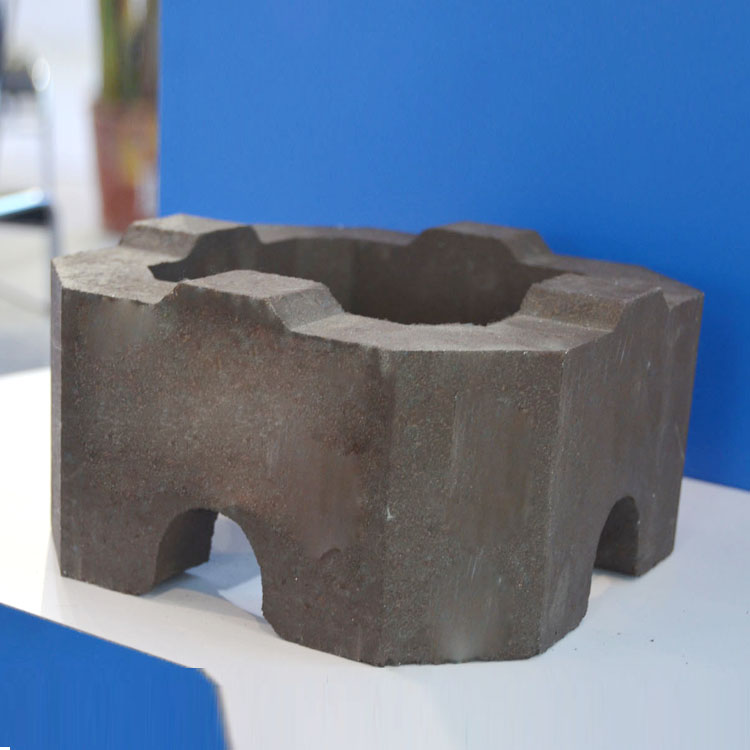.jpg?x-oss-process=image/resize,h_1000,m_lfit/format,webp)
In high - temperature industrial processes, refractory materials play a crucial role. They are the backbone that ensures the normal operation of various high - temperature equipment. Among these, magnesium zirconium bricks stand out as an excellent solution for enhancing refractory performance in multiple industries.
Magnesium zirconium bricks are mainly composed of fused magnesia and zircon sand. Fused magnesia, with its high melting point and excellent thermal stability, forms the basic framework of the brick. Zircon sand, on the other hand, provides additional strength and chemical resistance. This unique combination endows magnesium zirconium bricks with outstanding properties.
.jpg)
One of the most prominent features of magnesium zirconium bricks is their high density. The dense structure reduces the porosity of the bricks, effectively preventing the penetration of high - temperature gases and molten substances. Scientific research shows that compared with ordinary refractory bricks, the density of magnesium zirconium bricks can be up to 2.8 - 3.2 g/cm³, which is significantly higher. This high density not only enhances the mechanical strength of the bricks but also improves their thermal shock resistance.
Magnesium zirconium bricks also have excellent alkali resistance. In many industrial environments, alkaline substances are common, and they can cause serious corrosion to refractory materials. However, magnesium zirconium bricks can withstand the erosion of alkaline substances for a long time. Laboratory tests have demonstrated that in an alkaline environment at a temperature of 1200°C, the weight loss rate of magnesium zirconium bricks after 100 hours is less than 5%, while that of ordinary refractory bricks can reach more than 20%.
In addition, they have strong resistance to slag erosion. Slag is a common by - product in high - temperature industrial processes, and its erosion can greatly reduce the service life of refractory materials. Magnesium zirconium bricks can form a dense protective layer on the surface when in contact with slag, effectively blocking the further erosion of slag.
Magnesium zirconium bricks are widely used in industries such as glass kilns and regenerators. In glass kilns, they are used to build the furnace lining. The high - temperature environment in glass kilns requires refractory materials with excellent thermal stability and corrosion resistance. Magnesium zirconium bricks can maintain their structural integrity at temperatures up to 1600°C, ensuring the long - term stable operation of the glass kiln. For example, a large - scale glass manufacturing enterprise replaced the original refractory bricks with magnesium zirconium bricks in its glass kiln. As a result, the service life of the kiln was extended from 2 years to 3.5 years, and the production efficiency was also improved by about 15%.
In regenerators, magnesium zirconium bricks are used to store and transfer heat. Their high heat storage capacity and good thermal conductivity make them an ideal choice for regenerators. A regenerator project using magnesium zirconium bricks showed that the heat transfer efficiency was increased by about 20% compared with the previous system, and the energy consumption was reduced by about 18%.
.jpg)
Using magnesium zirconium bricks can bring many benefits to enterprises. Firstly, it can significantly improve the service life of equipment, reducing the frequency of equipment replacement and maintenance. Secondly, it can reduce production costs. The high efficiency and energy - saving characteristics of magnesium zirconium bricks help enterprises save energy and raw materials. Thirdly, it can improve product quality. The stable operation of high - temperature equipment ensures the consistency and quality of products.
In the ceramic industry, a well - known ceramic manufacturer adopted magnesium zirconium bricks in its high - temperature firing kiln. After using these bricks, the product defect rate was reduced from 8% to 3%, and the production cost was reduced by about 12% due to the extended service life of the kiln and lower energy consumption.
In the steel industry, a steel plant used magnesium zirconium bricks in its converter lining. The lining's service life was extended from 800 heats to 1200 heats, which not only reduced the cost of refractory materials but also increased the production capacity of the converter.

In conclusion, magnesium zirconium bricks, with their excellent characteristics, wide - range applications, and significant benefits for enterprises, are the optimal choice for enhancing refractory performance in multiple industries. If your enterprise is looking for a high - quality refractory solution, don't hesitate to choose magnesium zirconium bricks. Contact us now to learn more about our magnesium zirconium brick products and take the first step towards improving your refractory performance!


